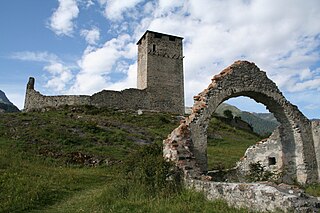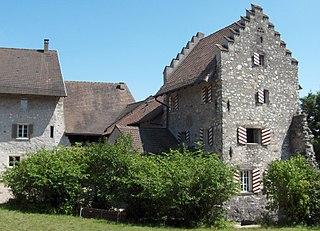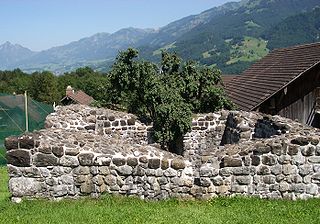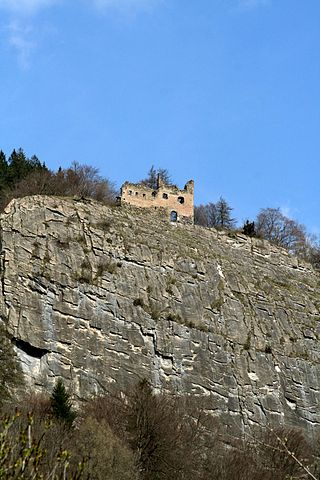
Steinsberg Castle is a ruined castle in the former municipality of Ardez of the Canton of Graubünden in Switzerland. It is a Swiss heritage site of national significance.

Tschanüff Castle is a ruined castle in the former municipality of Ramosch of the Canton of Graubünden in Switzerland. It is a Swiss heritage site of national significance.

Santa Maria in Calanca Castle is a tower in the municipality of Santa Maria in Calanca of the Canton of Graubünden in Switzerland. It, along with the neighboring Church of the Assumption of St. Mary, are both Swiss heritage sites of national significance.

Sogn Parcazi Castle and Church is a ruined castle and fortified church in the municipality of Trin of the Canton of Graubünden in Switzerland. It is a Swiss heritage site of national significance.

Spiez Castle is a castle in the municipality of Spiez of the Swiss canton of Bern. It is a Swiss heritage site of national significance.

Erguel Castle is a ruined castle in the municipality of Sonvilier in the canton of Bern in Switzerland. It is the best preserved castle ruin in the French-speaking Bernese Jura.

The ruins of Grünenberg Castle, Schnabelburg Castle and Langenstein Castle are a complex of three interconnected castles on a hill above the municipality of Melchnau in the canton of Bern in Switzerland. The three castles formed the center of power of the Barons of Grünenberg in the Oberaargau region during the High Middle Ages.

Altenburg Castle is a castle in the village of Altenburg bei Brugg in the municipality of Brugg in the canton of Aargau in Switzerland. The castle and the Altenburg Roman ruins, which are integrated into it, are classified as Swiss heritage site of national significance.

Rosenberg Castle is a ruined castle located near the villages of Burghalden and Schachen to the north of the municipality of Herisau in the canton of Appenzell Ausserrhoden in Switzerland.

Landenberg Castle is a ruined castle atop a hill in the municipality of Sarnen in the canton of Obwalden in Switzerland. In the 18th century an armory and firing range were built on the site. The Landenberg Armory is a Swiss heritage site of national significance. The ruins of the castle was the meeting place of the Landsgemeinde or Cantonal assembly for over three centuries.

Rudenz Castle is a ruined castle atop a hill in the municipality of Giswil in the canton of Obwalden in Switzerland. The castle and surroundings are a Swiss heritage site of national significance.

Rosenberg Castle is a ruined castle in the municipality of Giswil in the canton of Obwalden in Switzerland.

Cagliatscha Castle German: Burg Cagliatscha is a ruined castle in the municipality of Andeer in the Viamala Region of the canton of Graubünden in Switzerland.

Heinzenberg Castle German: Burg Heinzenberg is a ruined castle in the municipality of Cazis in the Viamala Region of the canton of Graubünden in Switzerland.

Neu-Süns Castle, Neu-Sins Castle or Canova is a ruined castle in the municipality of Domleschg in the Viamala Region of the canton of Graubünden in Switzerland.

Serviezel Castle is a pair of ruined castles in the municipality of Valsot of the Canton of Graubünden in Switzerland. Very little is known about either castle and they were probably both built in the 12th century for the Lords of Ramosch. Serviezel (Ramosch) is located in the former municipality of Ramosch, while Serviezel (Tschlin) is about 6.1 km (3.8 mi) away in the former municipality of Tschlin.

Lichtenstein Castle is a ruined castle in the municipality of Haldenstein of the Canton of Graubünden in Switzerland.

Strassberg Castle is a ruined castle in the municipality of Churwalden of the Canton of Graubünden in Switzerland.

Castelberg Castle is a ruined castle in the municipality of Ilanz/Glion of the Canton of Graubünden in Switzerland.

The Vorburg is a ruined castle located in the village of Oberurnen, now part of the municipality of Glarus Nord in the Canton of Glarus of Switzerland. It is the most significant castle in the canton.





















